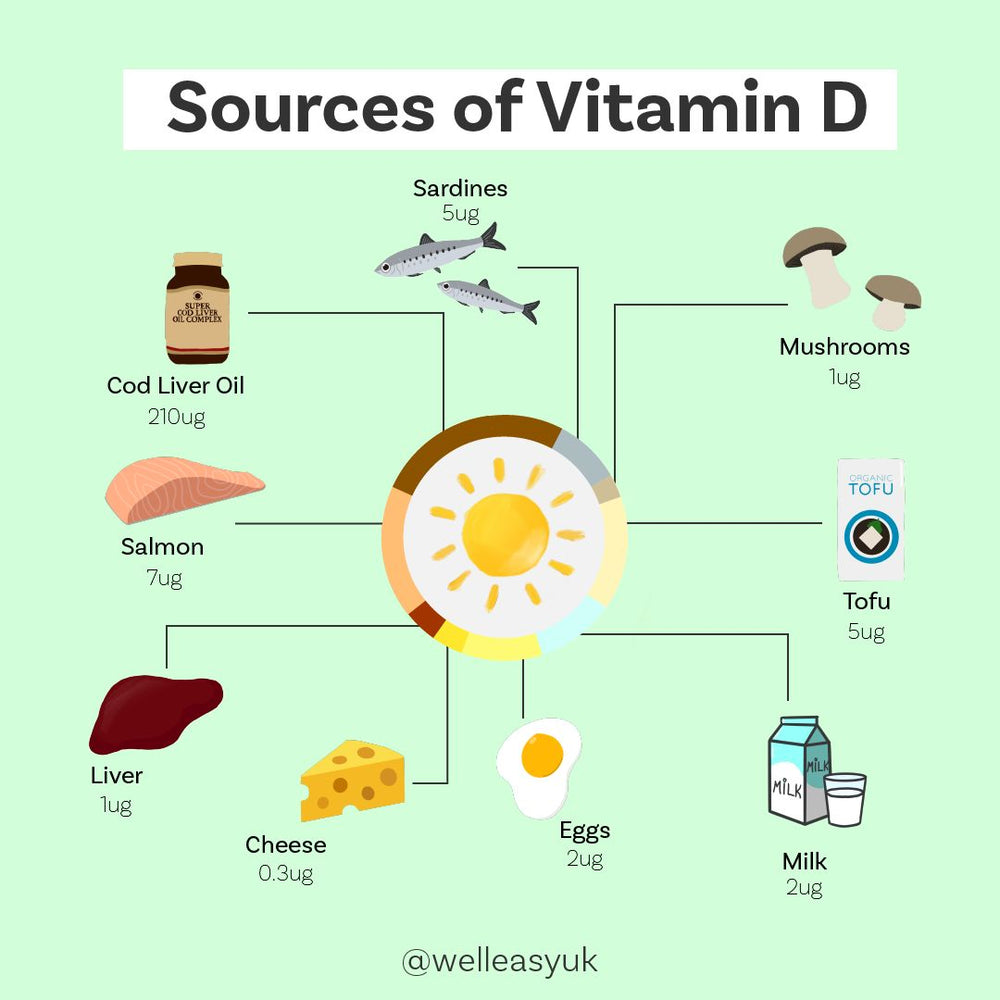
Let's Talk About Vitamin D

Let's Talk About Vitamin D
Let's Talk About Vitamin D
What is Vitamin D?
Vitamin D, despite the name, is not actually a vitamin, but a prohormone, or precursor of a hormone. As a response to sun exposure the body produces vitamin D. You can also boost your vitamin D intake through different foods or supplements as part of a healthy, balanced diet.
Why is it important to be mindful of Vitamin D...
The largest proportion on our bodies Vitamin D is created via sunlight (90%) and stored, utilised over the winter months. However, vitamin D breaks down quite quickly, meaning that stores can run low. This is strongly the case in the UK where sunlight hours are reduced and the suns rays are less potent. Which means as the winter rolls through, our stores become decreased which is why it is important to look to improve your diet and consume sources that will help to keep your levels optimal.
What are the benefits of Vitamin D?
Vitamin D has an incredibly important role to play in helping the body absorb and retain calcium and phosphorus from the gut into the bloodstream, which help to support bone and teeth health.
In more recent research, further benefits of Vitamin D have been discovered, such as...
- helping to control infections
- protection against some diseases
- supports in reducing inflammation
- regulating insulin levels
- supporting cardiovascular, immune, brain, and nervous system health
- able to reduce certain cancer cells growth by influencing the expression of the genes involved in cancer development.
There are two types of Vitamin D:
Vitamin D2 originates from plant-based sources and it is also seen in fortified foods, such as dairy products and cereal products. Vitamin D2 is most commonly found in fortified food products as it is more cost effective to produce.
Vitamin D3 is commonly known as the sunshine vitamin. When your skin is exposed to sunlight, it produces vitamin D3. It is also found in animal sources such as oily fish, animal liver and egg yolks.
Signs of a vitamin D deficiency:
- Tiredness / lethargic
- Brain fog
- Low mood / depression
- Impaired wound healing
- Hair loss
- Muscle and bone pain
- Increased risk of cardiovascular disease
A simple blood test by your GP will help to identify if you do have a vitamin d deficiency.
How much Vitamin D do we need?
Now the question on how much vitamin D you may need depends on many different factors. These include:
- your age
- your ethnicity
- the season
- current levels sun exposure
- what you wear
The amount of Vitamin D in a food product is measured in micrograms (ug) or international units (IU). One microgram of vitamin D is equal to 40 IU.
Recommendations per day are as follows for dietary requirements:
- Infants 0–12 months: 400 IU (10 ug).
- Children 1–18 years: 600 IU (15 ug).
- Adults up to 70 years: 600 IU (15 ug).
- Adults over 70 years: 800 IU (20 ug).
- Pregnant or lactating women: 600 IU (15 ug)
However, some studies find that the daily intake needs to be higher if you do not have regular exposure to the sun, are menopausal or have darker skin tones.
Vitamin D levels that are consumed at extremely high levels for long periods of times can cause a negative impact such as hypercalcaemia. However, you can't overdose on vitamin D through exposure to sunlight. But always remember to cover up or protect your skin if you're out in the sun for long periods to reduce the risk of skin damage.

*approx values per 100g - milk, cheese and tofu coming from fortification.
To summarise:
Vitamin D plays a vital role in our health and wellbeing. It is important to regularly check in with how your body is feeling, especially over the winter months and ensure you have a lifestyle and diet that supports, maintains and regulates sustainable Vitamin D levels throughout, in order to keep you healthy and functioning optimally.
Supplementation of products high in Vitamin D can help to support you, especially over the winter months. At WellEasy we have a vitamin D supplement section, with the highest quality Vitamin D supplements in their highest potency form. In order to keep you healthy and functioning optimally.






